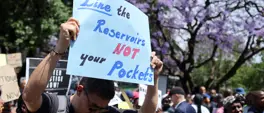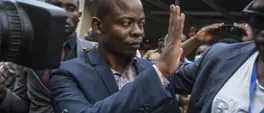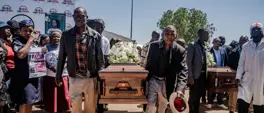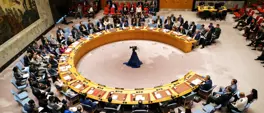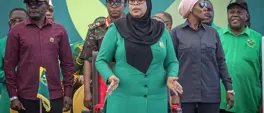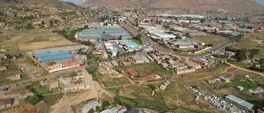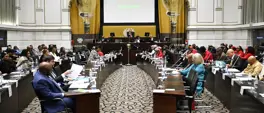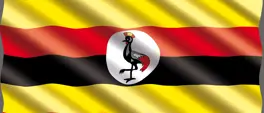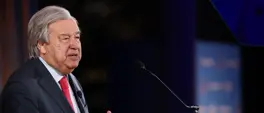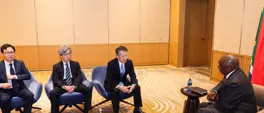Sudan army says Khartoum state 'completely free' of paramilitaries
AFP
20 May 2025 | 16:55The conflict has killed tens of thousands of people, displaced 13 million and created what the United Nations describes as the world's worst humanitarian crisis.
KHARTOUM, SUDAN - The Sudanese army said on Tuesday it had dislodged rival paramilitaries from their last positions in Omdurman, part of the Sudanese capital, securing all of Khartoum state nearly two months after recapturing the capital's centre.
"We affirm that Khartoum state is completely free of rebels," military spokesman Nabil Abdallah said in a statement, referring to the paramilitary Rapid Support Forces (RSF), locked in a brutal conflict with the regular army since April 2023.
In its biggest victory since the war began, the army in March recaptured central Khartoum, pushing the RSF to retreat to two holdout positions: Salha, south of Omdurman, and Ombada to the west.
The army said it launched on Monday a "large-scale offensive" to push the RSF out of both, with explosions from the clashes heard across the city, an AFP correspondent reported.
The RSF did not immediately comment on the military's latest announcement, which would cement army control over central Sudan, pushing the paramilitaries back towards their stronghold in the vast western region of Darfur.
The war, now in its third year, pits the army led by Abdel Fattah al-Burhan against the RSF, under his former deputy Mohamed Hamdan Daglo.
The conflict has killed tens of thousands of people, displaced 13 million and created what the United Nations describes as the world's worst humanitarian crisis.
It has also effectively split Africa's third-largest country in two, with the army holding the centre, north and east while the RSF controls nearly all of Darfur and, with its allies, parts of the south.
'SHARE LIABILITY'
The latest battles around Khartoum come as both sides seek to install rival governments.
On Monday, Burhan tapped former UN official Kamil Idris as prime minister, in what analysts see as an attempt to present a functioning civilian-led administration amid the ongoing war.
Both the Arab League and the African Union have welcomed the appointment, with the former calling it an "important step toward restoring the work of national civil institutions".
The African Union in turn called it "a step toward inclusive governance" and expressed hope the move would "restore constitutional order and democratic governance".
Burhan also appointed two women, Salma Abdel Jabbar and Nawara Abu Mohamed, as members of the ruling Transitional Sovereignty Council, while stripping the body of its powers to oversee the cabinet -- moves aimed at showing progress towards civilian rule, said analyst Kholood Khair.
She said Burhan wants to "maintain power but share liability... because everything is now blamed on him".
His latest moves were also meant to appeal to the African Union after Sudan's membership was suspended in 2021, Khair added.
In April, the RSF said it would form its own government in territory under its control, though analysts say it is unlikely to win international backing.
'LIVES AT RISK'
After a major battlefield victory in March, when the army recaptured most of Khartoum, the RSF this month launched attacks deep into army-held territory.
Long-range drone strikes blamed on the paramilitaries have targeted key infrastructure in army-held northeastern Sudan, including the wartime capital Port Sudan and power stations supplying electricity to millions.
From their last remaining positions, the RSF had launched attacks across Khartoum, including drone strikes on three power stations that knocked out electricity in the capital last week.
Medical charity Doctors Withour Borders (MSF) reported the local water network had been forced out of service, risking the spread of cholera in the city as residents "will turn to different water sources".
Health ministry officials said on Tuesday that 51 people had died of cholera out of more than 2,300 reported cases in the past three weeks, 90 percent of them in Khartoum state.
READ: Army, paramilitaries clash near Sudan capital
MSF on Sunday said the electricity blackout had disrupted healthcare at the city's major hospitals, amid fears of heightened civilian suffering.
"The recurrent attacks on critical infrastructure place civilian lives at risk, worsen the humanitarian crisis, and undermine basic human rights," UN human rights expert Radhouane Nouicer warned on Monday.
In recent days, both the army and RSF have launched attacks across the country, trying to claim territory and cut off rival supply lines.
Get the whole picture 💡
Take a look at the topic timeline for all related articles.

